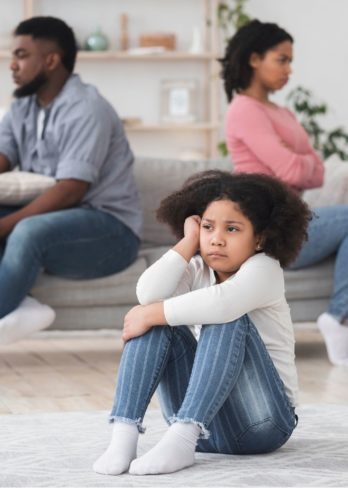

The 3 C’s of Kid’s Separation Education
Parents are constantly working to instill good values and positive behavior in their children, but kids also learn directly from our actions, even when we’re not actively working to teach them. More often than not, despite our best efforts, children will absorb far more from what we do than what we say. When it comes to divorce or separation, children will have a front-row seat to observe how their parents handle complex emotions and conflict. They won’t expect you to stick every landing perfectly, but they will learn a considerable amount from how you typically find your way through the challenges of co-parenting. Consider these 3 C’s to make sure your child’s separation education provides them with a strong base for navigating conflict in the future.
Conflict Communication
Very few parents will go through a separation or a divorce without at least some conflict. The end of a significant relationship will almost always be accompanied by strong emotions. No one expects parents to completely stifle their emotional reactions; however, when strong feelings create seemingly never-ending conflict or harsh arguments, it’s time to examine how you’re teaching your children to treat others when in the midst of a disagreement.
Inappropriate comments, silent treatments, stonewalling, refusal to compromise: these are all traits and actions that you likely do not wish to instill on your children, so be sure to minimize how often you display them yourself. When you do slip up, it’s important to acknowledge the mistake and move forward. You’ll be teaching your child not only how to move beyond temporary hiccups, but to also be humble when it comes to your own behavior.
Coping
When going through any difficult situation, self-care can easily fall by the wayside. Manifesting in many different ways such as poor eating habits, hypersensitivity, and lethargy. Poor coping strategies can leave long-lasting impressions on children, affecting how they respond to similar strains on their psyches well into adulthood. Separation can elicit new and stressful emotions that can leave you feeling drained, unmotivated, and unable to process stressors healthily. Nevertheless, it’s important that you strive for exhibiting positive coping strategies for your children because they will likely be the same methods they employ as adults.
Compassion
It can be hard to be selfless during a divorce or separation. With so much of daily-life changing, it’s easy to surrender to the urge to grasp at every opportunity to fulfill your own wants or desires. More often than not, however, this impulse can lead to behaviors that interfere with any chance at compromise. Combatting this urge, putting your child’s needs ahead of your own (especially when it means granting a favor to your co-parent) can teach your kids a great deal about compassion and understanding. They may not recognize it when they’re young, but as they grow, they’ll be able to see how you modeled your decisions around their best interests, even when it meant granting requests from their other parent.
Your children will be looking to you, watching how you navigate obstacles, how you treat others, how you move beyond conflict for their entire lives. With the unavoidable level of uncertainty that accompanies it, separation will cause your children to watch your behavior during this time even more intently. By being aware of how your actions will teach your children about conflict, and striving to set a great example, you’ll be giving them the tools to cope with similar situations well into adulthood.
Source: https://www.ourfamilywizard.com/blog/what-will-your-divorce-teach-your-child
